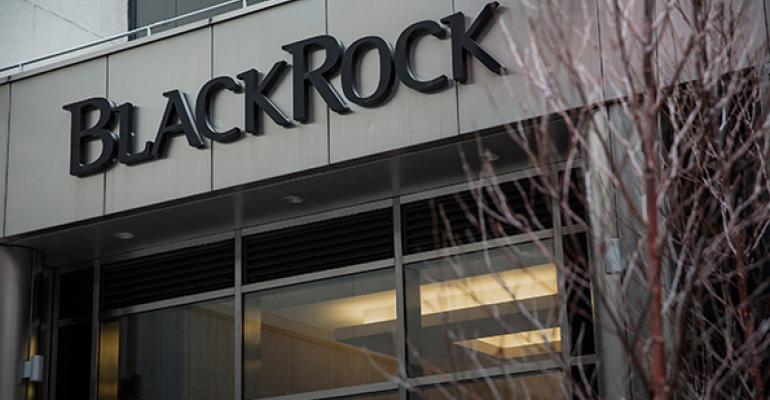(Bloomberg) -- If BlackRock Inc.’s largest ESG-labeled exchange-traded fund is a bellwether for the sustainable investing industry, it’s fair to say the US sector may be in for a bumpy ride.
The assets of the iShares ESG Aware MSCI USA ETF (ticker ESGU) have dropped to $13.8 billion from a high of $25 billion as recently as a year ago. The slump occurred as shareholders pulled money from the ETF, but also as its investment performance trailed benchmark indexes, including the S&P 500, over the past two years.
A recent $4 billion withdrawal from ESGU shows “the concentration risk” that exists in this sector, said Shaheen Contractor, senior ESG strategist at Bloomberg Intelligence. Last year, roughly 22% of the net new investments in environmental, social and governance-focused ETFs went to just 10 funds, and most of the inflows were large one-off allocations from institutional investors, she said.
It’s possible these same investors might suddenly decide to reduce their stakes. The outsized impact such outflows can have raises questions about the industry’s prospects for long-term growth, Contractor said.
BlackRock has declined to discuss the $4 billion outflow from ESGU, and it’s unclear who withdrew the funds. However, industry analysts said they suspect the trade involved a so-called model portfolio shift. On the same trading day that billions of dollars moved out of ESGU, a similar amount of cash poured into BlackRock’s iShares MSCI USA Quality Factor ETF (QUAL), which isn’t an ESG-focused fund.
In a statement, BlackRock did say the firm actively manages its “models to capture opportunities in the market. Some ETFs included in BlackRock model portfolios experience inflows or outflows, driven by advisers who trade their clients’ portfolios in line with BlackRock’s models.”
While it’s possible the outflow from ESGU isn’t linked to overhanging concerns about the future of ESG investing, “the effects of concentration risk are clear,” Contractor said.
Jerome Powell, chairman of the US Federal Reserve, during a news conference following a Federal Open Market Committee (FOMC) meeting in Washington, DC, US, on Wednesday, March 22, 2023. The Federal Reserve raised interest rates by a quarter percentage point and signaled it's not finished hiking, despite the risk of exacerbating a bank crisis that's roiled global markets. Photographer: Al Drago/Bloomberg
The global assets of ESG ETFs are currently at about $471 billion, down from $486 billion as recently as January, according to Bloomberg Intelligence. More recently, investors pulled almost $4.4 billion in the week ended March 17 and another $142 million in the week ended Friday, data compiled by Bloomberg show.
Another headache confronting the ESG industry is the looming downgrade by MSCI Inc. of about 31,000 funds. The research firm said it now believes the threshold required to receive a top rating of AA or AAA “should be more rigorous and ambitious.”
Joe Dabrowski, deputy director of policy at the UK Pensions and Lifetime Savings Association, whose members oversee a combined £1.3 trillion ($1.6 trillion), said any significant change in ratings will prompt investors to re-examine their fund holdings to establish whether they continue to “deliver in line with their strategy and investment beliefs.” Unreliable ESG ratings are “an industrywide problem” that can “lead to greenwashing,” Impact Cubed, an ESG data provider, said in a statement
Read more: MSCI to Cut ESG Scores of Over 30,000 Funds in Mass Review
And then there are performance concerns. Many ESG funds have been trailing market benchmarks since the US Federal Reserve started increasing interest rates last March, prompting equity investors to favor “value” stocks like oil and gas producers over “growth” stocks such as technology companies.
Eric Balchunas, senior ETF analyst at Bloomberg Intelligence, contends Fed Chairman Jerome Powell “has done more to damage ESG than Florida Governor Ron DeSantis could ever dream of,” adding that “the political stuff is secondary to what’s happened to rates and the simple fact is many funds are currently underperforming.”
It’s not only ESGU that’s trailing the broader market. The $5.9 billion Vanguard ESG US Stock ETF (ESGV) has declined 1.8% during the past two years, compared with the 4.9% advance of the S&P 500 in the same period.
This year, the average ESG-focused fund in the US rose 1.2% as of Friday, lagging behind the S&P 500’s 3.8% advance and the 3.6% return of the Russell 1000 in the same period, according to Bloomberg data.
Balchunas says ESG metrics are here to stay because active managers are always going to take the strategy’s considerations into account when deciding what to buy and sell. For example, investing in clean technologies clearly makes sense, he said.
Still, Balchunas says that unless performance improves soon, “we are going to find out who are the true believers in ESG.”
--With assistance from Natasha White.
To contact the author of this story:
Tim Quinson in New York at [email protected]





